Nearly 500 Workers Arrested in U.S. Immigration Raid at Hyundai Factory in Georgia: A Turning Point in Trump’s Second Term
The United States is once again in the spotlight of international headlines after nearly 500 people were arrested in an immigration raid at a Hyundai factory in Georgia, marking the largest workplace enforcement action during President Donald Trump’s second term. The operation, carried out by U.S. Immigration and Customs Enforcement (ICE), has already sparked fierce debates on immigration, labor practices, and the future of foreign investment in the American South.
The Raid: A Snapshot of Immigration Enforcement
According to official reports, ICE agents stormed a Hyundai facility in Georgia earlier this week, detaining close to 500 undocumented workers. Many of those arrested had been employed in production lines and support services, highlighting once again the deep reliance of U.S. manufacturing on immigrant labor, both documented and undocumented.
The operation was not only notable for its scale but also for its symbolism. President Trump had promised in his re-election campaign that his administration would take a tougher stance on illegal immigration and prioritize “American jobs for American workers.” This raid appears to be a clear attempt to deliver on that promise.
However, the arrests also raise pressing questions about labor shortages, the responsibility of large corporations in verifying their workforce, and the humanitarian impact on families and local communities in Georgia.
Why Hyundai, and Why Now?
Hyundai, one of the world’s leading automakers, has been investing heavily in the southern United States over the past two decades, making Georgia a hub for auto manufacturing. The factory targeted in the raid is considered one of the flagship facilities for the brand in North America, employing thousands of workers and supplying vehicles to both U.S. and global markets.
Critics argue that the timing of the raid is politically motivated. With Trump’s approval ratings under pressure and debates on immigration dominating headlines, a high-profile enforcement action against a multinational company sends a clear political message. Supporters, on the other hand, argue that no company should be above the law and that enforcing immigration regulations is a matter of national sovereignty.
Yet, this enforcement action also reveals the contradictions of U.S. economic reality. While politicians push for stricter immigration rules, industries like agriculture, construction, and auto manufacturing continue to depend heavily on immigrant labor — often willing to work under conditions that U.S. citizens reject.

Human and Social Impact
The human consequences of this raid cannot be ignored. Nearly 500 people now face detention, deportation, and uncertain futures. Many of them have lived in the United States for years, raising families, paying taxes, and contributing to local economies.
For children of detained workers, especially those who are U.S. citizens by birth, the raid represents a traumatic separation. Local schools, churches, and nonprofit organizations are already scrambling to provide assistance to families who suddenly find themselves without breadwinners.
The psychological toll of these large-scale raids extends beyond those arrested. Immigrant communities across the South are now living in heightened fear, with many workers afraid to show up for work, visit hospitals, or even send their children to school.
Economic Consequences
From an economic standpoint, the raid has multiple layers of impact:
- Production Disruption: The removal of nearly 500 workers will inevitably slow down operations at the Georgia factory, causing supply chain delays and potential losses for Hyundai in one of its most competitive markets.
- Labor Shortages: The auto industry already struggles with workforce shortages. Removing undocumented labor without providing a pathway for legal workers to replace them will only exacerbate the problem.
- Investor Confidence: Foreign corporations operating in the United States are closely watching this case. The message it sends could be detrimental: even global giants like Hyundai are vulnerable to sudden government crackdowns.
- Local Economies: The arrested workers were part of local consumption chains. Their absence reduces spending power in surrounding communities, affecting small businesses and services dependent on immigrant customers.
Is This Sustainable Policy?
While immigration enforcement is a legitimate function of any government, the strategy of large-scale workplace raids has been widely criticized as short-sighted and counterproductive.
First, such raids punish workers far more than corporations. Although Hyundai may face investigations and potential fines, the immediate human cost falls disproportionately on vulnerable individuals who had little power to change the hiring practices of a multinational company.
Second, these actions fail to address the root causes of undocumented labor. Employers rely on immigrants because of labor shortages, low wages, and the unwillingness of native workers to take certain jobs. Without structural reforms to immigration policy and labor law, raids only treat the symptoms while leaving the disease intact.
Finally, mass arrests feed into a climate of fear and division, undermining social cohesion and generating hostility between communities. Instead of integrating immigrants into the formal labor market, enforcement-only strategies push them further underground, making them more vulnerable to exploitation.
What Comes Next?

Looking ahead, several scenarios could emerge from this high-profile raid:
- Stricter Corporate Accountability: The U.S. government may use Hyundai as an example to pressure corporations to implement more rigorous verification systems (e.g., mandatory E-Verify nationwide). If enforced, this could alter hiring practices across industries but also slow down recruitment and increase operational costs.
- Acceleration of Automation: To reduce dependence on immigrant labor and avoid regulatory risks, automakers may accelerate investments in automation and robotics, potentially displacing thousands of jobs in the medium term.
- Legal and Political Backlash: Civil rights groups, labor unions, and immigrant advocacy organizations are already mobilizing to challenge the legality and morality of such raids. Prolonged legal battles could influence immigration reform debates in Congress.
- Chilling Effect on Foreign Investment: Multinational corporations could think twice before expanding U.S. operations if labor enforcement risks increase unpredictably. This could benefit competitor countries in Latin America or Southeast Asia, where labor costs are lower and immigration enforcement is less disruptive.
- Policy Shift under Future Administrations: While Trump has doubled down on enforcement, future administrations may reverse course, adopting more pragmatic policies such as pathways to legalization for long-standing workers.
A Defining Moment for U.S. Immigration and Industry
The Hyundai raid in Georgia is more than a headline about 500 arrests; it is a reflection of the ongoing clash between economic reality and political rhetoric. On one hand, the U.S. economy relies on immigrant labor to keep industries like auto manufacturing running. On the other, political leaders push enforcement measures that destabilize communities and create uncertainty for global investors.
Critically, the future of immigration enforcement in the United States must go beyond headline-grabbing raids. Without comprehensive reform that balances border security, labor market needs, and humanitarian considerations, the cycle of crackdowns, labor shortages, and social disruption will continue.
For Hyundai, this may be a painful lesson about the risks of navigating U.S. labor markets under a hardline administration. For America, it is a defining moment: will the nation choose to remain a global hub for investment and opportunity, or will fear-driven enforcement drive away both workers and capital?
